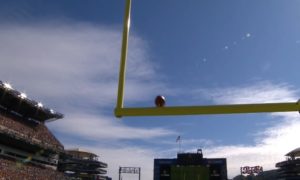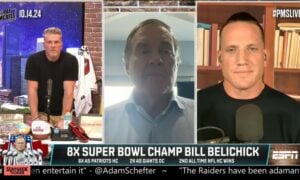Following reports of “back-channel” discussions between the league office and the New England Patriots, including a documented face-to-face meeting between Commissioner Roger Goodell and team owner Robert Kraft, the organization announced yesterday at the league’s Spring meetings that it would not appeal the NFL’s decision relating to the Deflategate scandal.
Earlier in the month, investigator Ted Wells released his findings, which determined that Patriots quarterback Tom Brady was more likely than not to have been involved in a conspiracy to tamper with game day footballs after their official inspection, specifically, further deflating them beyond legal limits.
Brady was suspended for the first four games of the 2015 regular decision based on the investigations findings, the organization’s cooperation with the investigation, and their prior history of violations relating to the integrity of the game.
In addition, the Patriots institutionally were fined a league-record $1 million and were forced to forfeit their 2016 first-round draft pick and 2016 fourth-round draft pick. The categories of punishment are considered a separate category, and Kraft’s decision not to appeal the institutional portion has no bearing on Brady’s appeal of his suspension.
Since the release of the Wells Report, Kraft and the Patriots organization have collectively been defiant in its retaliation against the league-commissioned findings, going so far as to publish a website dedicated to elaborately addressing the report on a virtual point-by-point basis.
In light of which, Kraft’s statement yesterday feels even more hollow. The team owner’s speech gives off the sense that he believes he is doing the league a favor by allowing his team to be penalized as though it were just another one of the 32 teams.
In his speech, he stated that “at no time should the agenda of one team outweigh the collective good of the full 32”, yet that is certainly what the past couple of weeks have felt like, as fans of other teams were left wondering how the Patriots could so strongly admonish the league without retribution.
Kraft also went out of his way to emphasize the reluctance with which he chose not to appeal his team’s punishment, alluding to the high moral ground by appealing to the “spirit” of his “respect for the commissioner” and his belief that “he’s doing what he perceives to be in the best interest of the full 32”.
The entire saga has been laced with a sense of exceptionalism on the Patriots’ part that certainly seems imbalanced against the image of humility that Kraft attempted and failed to present yesterday.
One cannot help but wonder about the tone of those back-channel discussions, which evidently ended in an embrace between the Patriots owner and the commissioner, though there appear to be two prevailing theories.
Either Kraft learned that there was significant resistance from the rest of the ownership against the way he handled things, for which there may be some evidence, or perhaps he was given some indication that there would be some lenience in Brady’s appeals process. Should Brady’s suspension be reduced, of course, you know which theory will win out in the end.








